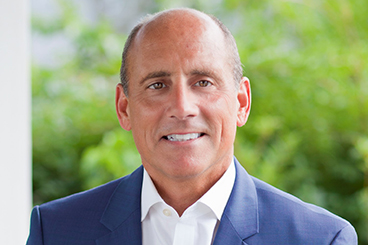Jonathan Mayhew joined Ontrak as chief executive officer in 2021 after serving as Chief Transformation Officer at CVS Health and in leadership roles at Aetna and Cigna.
Why Ontrak? Among the reasons is a passion to improve behavioral health for people with chronic conditions.
Health Evolution interviewed Mayhew about why he calls on all CEOs to offer behavioral health support to their health plan members or employee workforce to lower costs, the personal exposure to the health care system that drives him to succeed, what to expect from Ontrak in the near future, and more.
How does your professional background inform the way you lead Ontrak?
Mayhew: Number one, I have been in health care for my entire career and for me these issues around behavioral health and particularly the connections between behavioral health and chronic disease are some of the most vexing problems that exist in the industry. There’s the stigma. There’s also the industry’s inability or difficulty when it comes to funding behavioral health solutions. I’m looking at these issues continuing to create a cost burden and an access burden and a stigma burden and I just feel compelled to try to take the last section of my career and see if I can make a difference around some of the reported and realized mental health issues. So, I think it’s that insider perspective and knowing a bit about what has worked and what has not worked and what’s been tried and what hasn’t been to improve it.
What is Ontrak’s origin story or the inspiration fueling the company?
Mayhew: Terren Peizer is the founder of the organization. He instilled a founder-mission orientation. I have come to find, like so many people that do endeavor to get into the behavioral health industry, that there’s about one degree of separation from some experience in their life that inspires them to support the behavioral health and mental health industry and Terren’s story has a bit of that. He lost a family member with chronic disease and addiction related issues and I think that became his inspiration.
I’m in that one degree of separation scenario myself. I’m certainly sympathetic to the industry because of my own family circumstances in which my wife and I both developed cancer at the same time. Unfortunately, hers was terminal. We had three small kids. And as she was going into hospice and passed away, I was left trying to figure out how to get small kids sorted out in terms of grieving and bereavement and all of those adjacent issues.
My exposure was to learn that it’s really hard to seek care. How do you find the right providers? How do you even know where to go when you find the right provider? You can’t always get access to them in a timely way. So you end up seeking community-based programs that are funded through non-profit charity organizations. In my particular case they just were not well suited to deal with a four year old, a six year old and a ten year old. That was my first exposure to having anything connected to an emotional behavioral need for family members. And I began to realize that the system is just not set up to support some of the needs that people have and so I’ve brought that sensitivity, if you will, and a recognition of the need to develop resiliency and perseverance. That’s why I want to try and make a difference with Ontrak.
What makes Ontrak stand apart from other behavioral health solutions?
Mayhew: I would say a couple of things. One is that we’re a therapist-led, coach-driven model. Our coaching services are delivered by clinical individuals, certified coaches, nurses, some nurses with psych training and others more generally trained. Our model takes a whole-person approach to engagement to begin to understand the needs of various individuals. The best way to do that is to build trust and influence, so we can help individuals remove barriers, whether those barriers are lack of access, socioeconomic, cultural, related to health literacy, or their confidence in the ability to engage with the system. Once we develop that relationship it helps us to get people engaged with behavioral healthcare. We’re able to match them to the right kind of therapeutic or psychiatric intervention and know if medications are needed. We enable and maintain that engagement through technology and digital solutions. But the thing that really separates us is our ability to engage previously unengaged populations, and sustain that engagement for an industry-leading average of 7 months. Our program instills in people a sense of self-efficacy and to remain engaged with PCPs and specialists to support their chronic disease and overall health.










